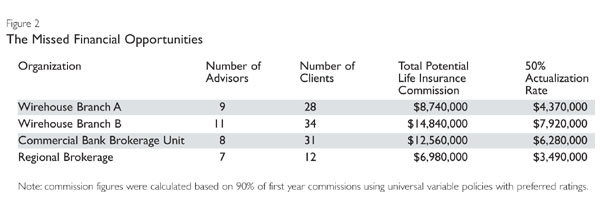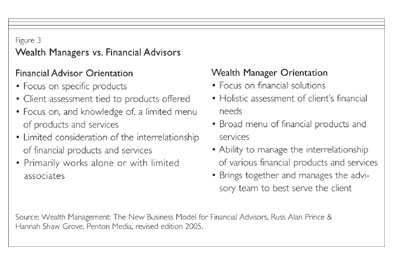As "open architecture" platforms become ubiquitous, an advisor's ability to access specialized financial products and services is no longer a distinguishing factor and, as a result, the platform itself doesn't drive the success of a wealth management business.
Attitude Is Everything
A
significant portion of an advisor's facility and effectiveness as a
wealth manager is derived from his vision for the role and how that
shapes the service and solutions he delivers. Advisors that migrate to
wealth management from another model must adopt a new operating
philosophy that reflects their new business approach. Figure 3
contrasts the mind-set and limitations of
average advisors and the perspective of wealth managers.
Wealth Management Is Process Driven
A
final shortcoming of the wealth management initiative at most financial
firms is their inability to create, adopt and use critical processes
that help business opportunities become revenue-generating
transactions. At a minimum, wealth managers must be able to:
1.
Identify the client-specific situations that may call for additional
products and services. This may require the involvement of outside
specialists and can be a complex and rapidly changing process depending
on the client's finances and needs. There are many ways to do this. We
created and continue to use a process based on the Whole Client Model
that allows advisors and their networks of experts to develop a
comprehensive understanding of an affluent client.
2. Convert a
specific opportunity to deliver new products or services into an
accessible and actionable recommendation that suits the client's style
and communication preferences, crystallizes the benefit and expected
results and presents a meaningful solution to a pressing issue or
concern. The best way to do this is with an individualized client
strategy that accounts for the unique qualities of each relationship.
The output from the Whole Client Model (see insert) will provide a good
deal of information for a client's strategy, as
will identifying a client's high-net-worth personality.
3.
Manage the many stages and facets of the implementation process in a
way that sustains momentum, keeps the client informed about timing and
results, galvanizes the team of specialists to work collaboratively and
continually measures the solutions against the client's goals and
objectives.
The Moral Of The Story
Affluent
individuals and families want the benefits of wealth management, and
financial services providers can be rewarded in numerous ways-not just
financially-by offering such capabilities to their wealthy clients.
Wealth management, however, is not a promise to be taken lightly, and
simply wanting or needing it will not be enough. The important lesson
for organizations and practitioners that advocate a wealth management
approach is that it requires dedication and commitment on the part of
everyone involved to do it well, deliver a worthy experience and reap
the rewards.











